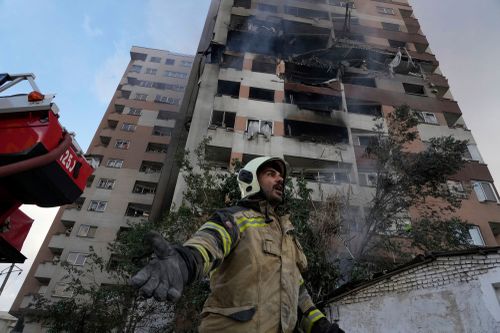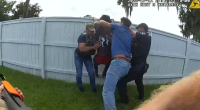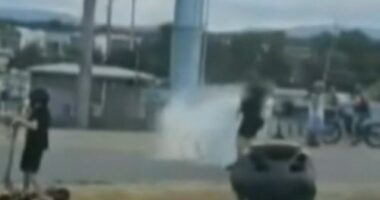Share this @internewscast.com
Iran did not immediately acknowledge or confirm the Israeli claims of their nuclear site but have vowed revenge.
According to civilian witnesses in Tehran who spoke with The Associated Press, there were reports of loud explosions in various parts of the capital, including the east, west, and center. Additionally, an AP journalist located in the northern area of the city reported hearing a blast as well.

Air defence systems were heard going off on Friday night in Tehran (Saturday morning AEST). There was no immediate acknowledgement from authorities.
At the same time, Israelis remain on high alert, anticipating a more significant response from Iran, which has already dispatched more than 100 drones targeting Israel in retaliation for the attacks that occurred on Friday.
On Friday, Israel launched intense strikes targeting the core of Iran’s nuclear and military capabilities. Utilizing warplanes and previously smuggled drones, Israel aimed at crucial facilities and key figures such as top generals and scientists. Israel justified this aggressive action as essential to prevent Iran from advancing further toward developing a nuclear weapon.
The ongoing military and intelligence operation raised the potential for all-out war between the countries and propelled the region, already on edge, into even greater upheaval.
Iran quickly retaliated by sending a swarm of drones at Israel, and Supreme Leader Ayatollah Ali Khamenei warned of “severe punishment.”
Iran had been censured by the UN’s atomic watchdog a day earlier for not complying with obligations meant to prevent it from developing a nuclear weapon.

Israel had long threatened such a strike, and successive American administrations had sought to prevent it, fearing it would ignite a wider conflict across the Middle East and possibly be ineffective at destroying Iran’s dispersed and hardened nuclear program.
Countries in the region condemned Israel’s attack, while leaders around the globe called for immediate de-escalation from both sides. The UN Security Council scheduled an emergency meeting for Friday afternoon at Iran’s request.
In a letter to the council, Iran’s Foreign Minister Abbas Araghchi called the killing of its officials and scientists “state terrorism” and affirmed his country’s right to self-defence.
“Israel will come to deeply regret this reckless aggression and the grave strategic miscalculation it has made,” he said.
Israel’s military said about 200 aircraft were involved in the initial attack on about 100 targets.
Its Mossad spy agency positioned explosive drones and precision weapons inside Iran ahead of time, and used them to target Iranian air defenses and missile launchers near Tehran, according to two security officials who spoke on condition of anonymity.

It was not possible to independently confirm the officials’ claims.
Among the key sites Israel attacked was Iran’s main nuclear enrichment facility in Natanz, where black smoke could be seen rising into the air.
It also appeared to strike a second, smaller nuclear enrichment facility in Fordo, about 100 kilometres south-east of Tehran, according to an Iranian news outlet close to the government that reported hearing explosions nearby.
Israel said it destroyed dozens of radar installations and surface-to-air missile launchers in western Iran.
Israel military spokesman Brig. Gen. Effie Defrin said the Natanz facility was “significantly damaged” and that the operation was “still in the beginning.”
The first wave of strikes had given Israel “significant freedom of movement” in Iran’s skies, clearing the way for further attacks, according to an Israeli military official who spoke on condition of anonymity because he was not authorised to discuss details of the attack with the media.
The official said Israel is prepared for an operation that could last up to two weeks, but that there was no firm timeline and it would depend largely on how Iran responds.
Israel calls attacks preemptive strikes on Iran’s nuclear program
Israeli leaders cast the attack as necessary to head off an imminent threat that Iran would build nuclear bombs, though it remains unclear how close the country is to achieving that or whether Iran had actually been planning a strike. Iran maintains its nuclear program is for civilian purposes only.
“This is a clear and present danger to Israel’s very survival,” Israeli Prime Minister Benjamin Netanyahu claimed as he vowed to pursue the attack for as long as necessary to “remove this threat.”
Israel is widely believed to be the only nuclear-armed state in the Middle East but has never acknowledged having such weapons.













